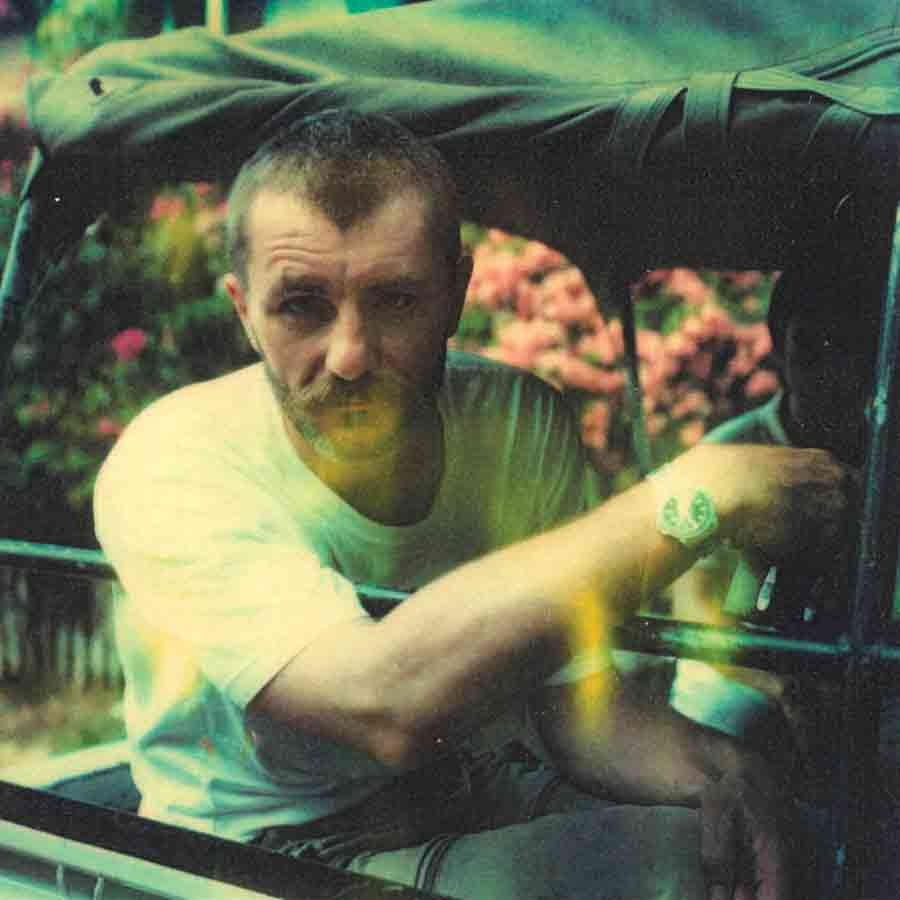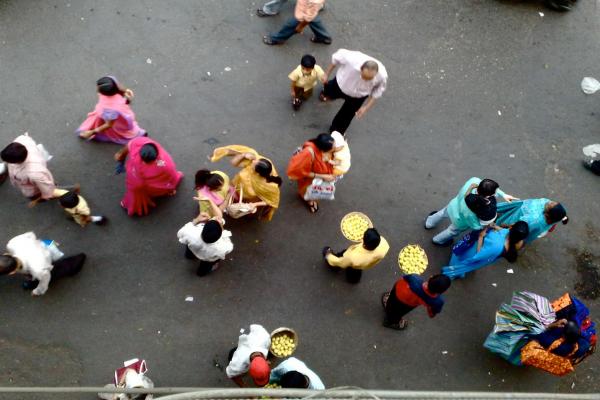Verge asked him why he does it—and how.
He is not “Indiana Jones” or “the Duke of Hazards”. He is not all about danger for danger's sake. Robert Young Pelton wants to get to the bottom of things firsthand. And if that means being holed up with a group of Chechen fighters in a basement in Grozny, while the city is pulverized by Russian bombs, he'll do it.
Author, filmmaker and adventurer, Pelton has travelled to many of the world's most dangerous places, trying to piece together what's happening on the ground. He's been kidnapped in Colombia, narrowly escaped a bombing in Uganda, survived a plane crash in Indonesia and, over the years, has hung out with enough rebel leaders to assemble a cammo-clad choir.
Recently returned from Iraq, Pelton spent a month riding with security forces along the notorious six-mile route between the airport and the green zone in Baghdad, while penning his latest book. Licensed to Kill: The Privatization of the War on Terror, due out in May 2006, uncovers the covert world of private security contractors and paramilitaries and their role in the so called “war on terror”.
“The publishers are pretty hot to trot on this one,” says Pelton, in a phone interview with Verge, from his home in California. “The book is basically a journey starting with the beginning of the war on terror when George Bush issues a license to kill. They don't have enough CIA full-time staff, so they start hiring paramilitaries and that expands into Iraq where it becomes a de facto industry. It's been two years in the making.”
Asked how the contractors reacted to him poking around, Pelton says they were fine with it. “ I didn't go into this book with any sense of investigative zeal. You know, my style is I just hang out, get to know people and then when something twigs my curiosity, I'll ask a few more questions or hang out a little bit longer.”
As an author, Pelton is probably best known for his book, The World's Most Dangerous Places, now in its fifth edition. A favourite among foreign aid workers and special forces personnel alike, it's a blunt, hilariously irreverent, firsthand-experience guide to surviving in regions where the only five-star ratings you'll see are on the danger scale.
Originally from Edmonton, Alberta, Pelton started travelling at the age of sixteen, not because he had been bitten by the travel bug, but because he had been all but abandoned by his parents. Home became a worn-out pink 1962 Rambler station wagon that he bought for $150.
Since then, Pelton has worked as a lumberjack, a tunneller, a blaster's assistant and for many years, he ran a highly successful marketing company. But eventually he began, as he puts it, “forcing myself to escape for at least a month every year to go do something interesting.” That usually meant taking off to explore some remote and usually hostile corner of the earth. “I think I was playing the businessman,” he says of his office days.
Following the deaths of several people he considered to be mentors, Pelton decided it was time for a change. “I realized if I don't start doing what I really want to do – whether I make a business out of it or not, it doesn't matter–if I don't start doing it, I'm just going to get run down by a truck or something one day and think, 'damn', you know?”
The innate curiosity that drives most of Pelton's forays into dangerous places is the same trait that makes 19th-century writer and adventurer, Sir Richard Burton, one of his heroes.
"You learn enough so that when you hear a bullet flying by your head, you know how far away it is and what direction it's coming from."
“He never did anything because he was going to get rich or famous or because it was cool,” Pelton muses. “He just had this burning intensity to find out more. He was an iconoclast. He was interested in doing his thing.”
For his part, Pelton's thing is focusing his roving, laser-beam curiosity on the stories that we don't always hear about in the mainstream press, the things that get buried, or swept under the carpet of network television, or go unreported because no one dares to get inside.
“Most of the media has turned into entertainment-owned organizations which rely on ratings,” he explains. “We saw that in the last Iraq war – it was like watching a football game. I was in Iraq during the war and I was blown away by this whole myth about WMDs [weapons of mass destruction]. When you're inside, you see things and you know things, and then you start reading newspapers.
Firsthand experience is what it's all about for Pelton. In his opinion, we've become disconnected from the realities behind what we watch on TV. He insists that it has serious implications for how we view the world. It's also what drives him to probe in places where most others are unwilling to go.
“Second-hand information is just information,” he says. “When we watch 'shock and awe' on TV, when we watch those bombs land on Baghdad, we don't know what it's like to be hit by a 2000 pound bomb.
“We make those decisions though. We make a decision to invade a country, and we watch it on TV and it doesn't seem to bother us too much – based on that second-hand information. And when you watch Al Jazeera and you see little kids with the tops of their heads blown off and they bleed to death and they die on camera because of these bombings, we don't show that over here, because that's too disturbing, even as a second-hand experience. Imagine it as a firsthand experience.”
In spite of Pelton's insistence on the importance of understanding things by experiencing them, he's certainly not encouraging people to understand world affairs by planning a two-week foray into the middle of a war zone. Venturing into the world's hotspots, he says, is a gradual learning process and requires building the skills and contacts over time, that will allow you to get you in and, more importantly, prevent your flying home in a bag.
“Part of the education process is to slowly learn enough so that when you hear a bullet flying by your head, you know how far away it is and what direction it's coming from. If you hear 50 bullets coming by your head, you know whether they're trying to track you or they're shooting someone else and if you hear a scud missile... [laughs]. It's a gradual education."
"I try to remind people that you don't just sit on a train that takes you someplace adventurous and at a certain time they serve you lunch."
Asked if there's an adjustment period when he first arrives, he says, “I guess I'm a little tweaked – I mean, when I was in Liberia with the LURD rebels, I had footage of them cutting peoples' hearts out and eating them while they were still alive and all kinds of gory things, which didn't phase me at all. And people say “that's what you do?” and to me, it was just kind of normal, people giving you a severed head as a gift after a battle was just what they do there. You forget that you get tweaked.”
Pelton seems to rely on gut instinct as much as on a set of learned 'war-correspondent skills'. He figures part of the reason he's still alive to tell the tale is because people seem to instinctively trust him.
“There's no manual,” he says. “Things aren't written down. The reason that I get along with Jihadis is the same reason I get along with the special forces and the contractors – there's the 'sniff test' – 'is this guy for real or is he wasting my time?' I think that I just have some kind of innate, weird vibe that I give off. I don't threaten people, but they take me seriously. It's enough of a combination that they want to get me to their leader or the front lines or whatever, and get me back without getting me blown up.”
He says that making local friends is key – people who will give you advice, warn you about things, help you to arrange transport. Pelton says he often enlists the help of local people.
Pelton concedes that gaining a better understanding of the world doesn't have to mean trading in your flip-flops and surf shorts, for a flak-jacket and a blue helmet. But, he says, what's missing in our society is the idea of the walk-about, where young people are sent off into the world to learn about it and prove their mettle. And while a rail trip through Europe, or backpacking through Costa Rica might seem like colouring between the lines to a guy like Pelton, he insists that it's all about attitude.
“I just try to remind people that you don't just sit on a train that takes you someplace adventurous and at a certain time they serve you lunch, you know? You do have to have a certain type of personality. It doesn't mean that you have to get dumped right into the middle of a battlefield and walk through people's brains. You can work for something like the Peace Corps, which is its own adventure. It's not ragged and dirty, but at least it gives you something other than sitting in a class in a university.
“Adventure doesn't have a nice cushy, comfortable ending with scripted journeys, you know, it's like, you point yourself in that direction and if you run out of money, you get a job and make some money, and if you get shot in the arm you go to the hospital. It's a process of dealing with life that's completely alien to some people.”
Having spent time in places where just reading the travel advisories would make your palms sweat, Pelton admits that his opinion about what is dangerous is probably a little different than most people's. But he insists that, in many cases, the danger is exaggerated.
“You read news reports about what it's like in the place, and it doesn't matter what you say, you just can't convince people that it's actually quite normal in places – although Grozny got a little insane.”
"It's only going to be a handful of people on this planet who were actually there and wrote down exactly what people said without an agenda."
Asked how his wife reacts to his forays into war zones, he says, “I got yelled at when I got kidnapped, as you might have guessed. I got yelled at when I was in Grozny too... But I think one of the things she's learned is that there's the perception of what I do, and there's what I actually do – and there's a difference. The media wants to suck up the more 'cinematic' concepts. She knows I wouldn't do anything really stupid because I want to come back home here and sit on the porch.” [laughs].
Is Pelton an adrenaline junky? Maybe. Maybe you have to be to pull off some of the things he has. But it's unlikely that it's the reason he's chosen to do what he does – there are lots of other ways to get that buzz. Instead, he says he reckons somewhere down the road, someone's going to try to work out what exactly was going on in the world at this point in time, and they're going to need some good, reliable information.
“Hopefully, at some point, people will go back and say, 'how the f--k did we get into this mess? For example, what was really going on in Chechnya? What was the story behind this?' But it's only going to be a handful of people on this planet who were actually there and wrote down exactly what people said without an agenda, and put it in a book and didn't really care if they made money off it, or they promoted a left or rightwing agenda.”
He says that if we really want to understand what's going on, we need to be looking at global economics, how it affects us now and its implications for the future. “Really it doesn't take that much to figure out how the global system works, and having experience travelling around the world, having friends out there, makes it easy to figure out what's going on.
“The other thing is, I think it's everybody's responsibility to learn about the world and life because it makes you a better person. I mean that doesn't sound very deep and meaningful but, I think it's something we've lost. I'd just encourage people – whatever capacity they have – to get out there and explore.”
Add this article to your reading list




